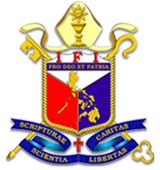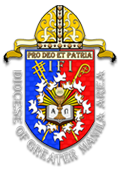GLORY TO GOD IN THE HIGHEST
(Reflection for Christmas Day, December 25, 2021)
John 1: 1-14
( Reprinted, with permission, from “O, Come Emmanuel: Advent and Christmas Prayers and Reflections”, booklet published by the Iglesia Filipina Independiente and issued at the National Clergy Convocation in Davao City, November 19, 2018.)

By: The Rev. Victoria S. Esguerra
Retired Priest, Diocese of Greater Manila Area
ISAIAH 52: 7-10 – PRAYER OF PRAISE AND JOY OF GOD’S SALVATION
Isaiah pronounced God’s promise that He would redeem His people Israel from the Assyrian oppression and would return them to Jerusalem. God would lead a Second Exodus, and said that His people should know His Name. This time the Lord would send His Suffering Servant (Anointed Messiah) to comfort His people, to redeem Jerusalem, and “all the ends of the earth shall see the salvation of God.” The messenger, Isaiah, announced peace, brought good news, and proclaimed salvation to the remaining faithful. Upon this good news, they sang with joy, praising: “ Your God reigns! The earth sees God’s salvation !”
PSALM 98 – PRAYER OF PRAISE WELCOMING THE WORLD’S JUDGE
The psalmist announced to the people to make a joyful noise and sing praises to the Lord because He won the victory and had vindicated His oppressed people in front of the nations. With the lyre, trumpet, and horn, they sang joyfully, and even the natural creation (seas, hills/ mountains) was enjoined to celebrate, as the “ Lord is coming to judge the world with righteousness and the peoples with equity. ”
HEBREWS 1: 1-4 (5-12) – PRAYER OF GOD THROUGH THE BELOVED SON
God proclaimed His Son the Anointed One, superior to the angels, and the One whose throne and scepter were in God’s Kingdom. Man should exalt God, the Creator of the heavens and earth; these would perish sometime, but God would remain forever. Regarding the angels, the writer said, “ Are not all angels spirits in the divine service, sent to serve for the sake of those who are to inherit salvation ?”
JOHN 1: 1-14 – PRAYER OF EXALTATION TO THE GOD INCARNATE
This is the testimony of John the Evangelist, beloved disciple and apostle of Jesus, son of Zebedee and brother of James. According to Bible scholars, John was the cousin of Jesus, as John’s mother, Salome, was the sister of Mary (Jesus’s Mother). John could have been 25 years old when Jesus called him to be His disciple; he was a former follower of John the Baptist. The story of Jesus, as narrated by John, did not start from His human birth or genealogy unlike the presentation of the other Gospel authors. John’s Gospel Prologue began with the divine origin of Jesus as emanating from the “Word of God ,” who shared God’s nature. The Gospel of John concerned the deity of Jesus Christ, co-eternal with God the Father. This “ Word ” (“ logos ” in Greek) became “ enfleshed” or incarnate, human, who lived among us. John explained the True Light of Jesus: (1) He outshone the darkness of the world; (2) His own people and the world did not recognize Him; (3) Those who recognized His glory were blessed with loving forgiveness, and (4) God accepted and welcomed them as His adopted children. John the Evangelist praised the “ glory of the Father’s Son, full of grace and truth .” Also, John the Baptist (Jesus’s cousin through John’s mother Elizabeth/sister of Mary) heralded that Jesus was the One who came after him but ranked higher than him because He was before him.
Creative Word . The “ Word ” was important in God’s mystical and mysterious process, far beyond the comprehension of the world. In the six days of God’s creation process in Genesis (Chapter 1), God the Father used the “ Word ” which made the heavens and the earth and all the living beings in it. Then He blessed and hallowed His creation, and rested on the seventh day.
Prophetic Word. God used the “ Word ” when He spoke to Moses in giving the Ten Commandments (also written on the Tablets) on Mount Sinai. God gave oral warnings (oracles) to the prophets to warn people of their sins and to be transformed from their inequities. Jesus became Human-God through the Word Incarnate . (John the Baptist was the voice of the one shouting in the wilderness). The Lord’s life and teachings in the Bible (Word of God) were orally transcribed and passed on to His chosen people for generations until the printing of God’s Word to this present time.
Human Word . It is the “ word ” or the voice (language) of humans that differentiates people from other animals. It is part of the God-given talent received by humanity from its Creator ( “Imago Dei ”). Words may be symbolic in picture images, in letters/alphabets, in vocal utterances, in artistic expressions, and in even present digital virtual language (including text messaging). In whatever mode it is presented, it may be an informal or formal means of communication between humans and God. The Liturgy of the Word with the Holy Eucharist is our highest form of communication (worship) with God. Our prayers (collective or individual/ public or private), songs of praise, liturgical dances and dramas, and lyrical grace offerings (prose, poetry, and the arts) are forms of our thanksgiving to God. Imperfect as we are, the “words” or “images” by the “broken pot,” including the self-inflicted brokenness in our lamentations and pleadings are heard by our Perfect Potter, the loving, understanding, and affectionate Parent-Creator.
Heartful Word-Acts . At this time of Advent and Christmas, our spoken (even unspoken) “words” express our deep relationship to our Lord and our neighbors. The Bible says that acts of kindness and charity (seen and unseen) bespeak louder of our Christian heritage and legacy because they emanate from the heart. At this opportune time, the shades of these word-acts become even more pronouncedly spoken and tested amidst the commercialism and consumerism of our environments. Even the digital gadgets we own tell how much we magnify our spiritual connection to God, or put greater priorities in our admired material possessions. Intending to make social communication faster and better, sometimes these gadgets are used as potential instruments for more alienation of our neighbors and those not-so-loved ones. But how about our spiritual connection to God, whether in virtual or plain old-fashioned language?
Which Gift? If we must make a choice this Christmas between giving or receiving a gift, taking into consideration our relationship to the Greatest Gift, Jesus Christ, which must it be: A Cell Phone or a Bible? (Envisioned by an unknown writer, here’s a comparison of the two gifts).
The Cell Phone (most important?):
- Always with us; can’t live/leave without it.
- Always visible; admired by people.
- The more expensive, the more desired.
- Proud to own; will sacrifice to buy one.
- Cell phones entertain; can do various tricks.
- Easy to send jokes, even lies and rumors.
- Easy to send more photos; more “likes”
- Text message short and easy; always read and updated.
- Updated cell phone models new and exciting.
The Bible (least important?):
- Leave it at home; too heavy to carry.
- Hidden; to avoid religious talk.
- Not expensive; not valuable.
- Not impressive; don’t care for one.
- Not read/not used/no tricks or games.
- No jokes to send/very boring.
- Can’t get friends; friends leave.
- Message too hard to understand.
- Models (versions) always old and the same.
After weighing the “Pros” and “Cons” of each one (gift), and making our choice, can we truly say that we have the BEST GIFT for ourselves/others and for the Best Giver of all Gifts?
MAY GOD’S WORD BE THE LANGUAGE OF OUR HERT!
MERRY CHRISTMAS!


